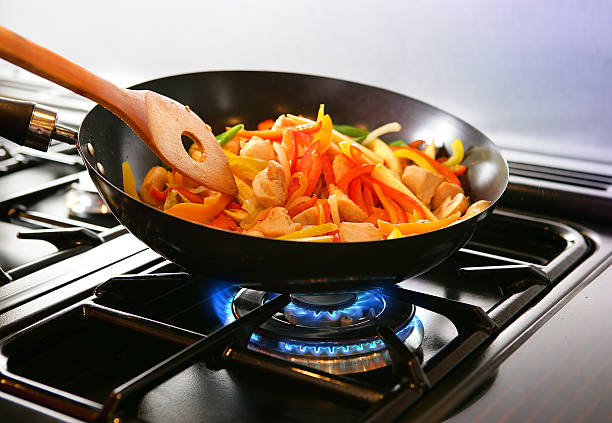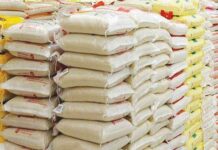Cooking gas 12.5kg refill costs N3,198 more in 2 months
By Jeph Ajobaju, Chief Copy Editor
Liquefied Petroleum Gas (LPG) popularly called cooking gas has jumped in price to N1,500 per kilogram, with 12.5kg cylinder refill rising from the official N15,552.56 in August to N18,750 actual market cost in October, a difference of N3,198.
In Abuja at the weekend, the price for refilling a 12.5kg cylinder rose 41.6 per cent to between N17,000 and N18,750 in different areas, after going for N11,735 in January and N12,000 in July.
Petroleum Resources Minister of State (Gas) Ekperikpe Ekpo pledged in August to ensure a reduction in the price of cooking gas, promising to invite regulators and producers to a meeting to find ways to slash the cost.
However, a new market survey shows the price has instead jumped even further.
Cooking gas currently sells for about N18,000 in Lokogoma area of the FCT, up from N12,000 three months ago, translating to about N1,500 per kilogram, according to a new market survey conducted by The PUNCH.
It goes for between N16,200 and N16,500 in the Kubwa area, from N12,000 previously; and for between N1,300 and N1,400 in the areas around Bwari, Kurudu, and Jikwoyi.
NIPCO suggests measures to tame rising price
Suresh Kumar, NIPCO Managing Director/Chief Executive Officer, explained that local production of cooking gas remains inadequate and urged Abuja to encourage Chevron to convert more of its propane output into propane as part of measures to bring down the price.
“Currently, less than 40 per cent of the 1.5 million metric tonnes consumed domestically is produced locally. This is why the government must encourage companies like Chevron to convert more of their propane output into butane, which is more suitable for domestic use,” he stressed.
Kumar made the point at the recent National Conference of the Nigerian Association of Liquefied Petroleum Gas Marketers 2024 held in Lagos.
“With the Dangote Refinery and other refineries now sourcing crude oil in local currency, the volume of LPG produced locally is expected to increase, which will, in turn, drive down the price of the commodity,” he said.
“There is hope that the reliance on imported LPG will decrease, which will positively influence the prices at which the product is sold domestically. Greater local production will make LPG more affordable since it reduces exposure to foreign exchange fluctuations and international pricing dynamics.
“Our latest assessments show that the existing downstream infrastructure is capable of handling up to 5 million MT annually. This means we are ready to accommodate increased production from both associated and non-associated gas fields within the country.”
Kumar disclosed NIPCO’s long-term vision is to become a leader in the marketing and distribution of cooking gas.
“Our strategy is driven by the fact that Nigeria has over 200 trillion cubic feet of gas reserves. We believe that the country’s gas consumption must be optimised through the promotion of both LPG for domestic use and CNG for the industrial and transportation sector.
“In 2008, we invested in an LPG facility in Apapa with a capacity of 5,000 metric tonnes. Today, that same facility has grown to over 20,000 metric tonnes, thanks to strategic partnerships with our subsidiaries.
“We have also deployed LPG tankers and established multiple stations across Nigeria to ensure easy access to cooking gas for households nationwide.
“At the time NIPCO entered the market, Nigeria’s domestic LPG consumption was around 50,000 metric tonnes annually.
“However, the past 16 to 17 years have been a remarkable journey. Today, the market has grown from 50,000 MT to approximately 1.5 million MT per year.
“Our vision is to harness these opportunities and grow the country’s LPG consumption from 1.5 million MT to levels more appropriate for a population of over 200 million people.
“We must work with the Nigerian Midstream and Downstream Petroleum Regulatory Authority and other stakeholders to end gas flaring in the country.
“Substantial investments are needed to capture and process flared gas to increase domestic supply beyond the current 1.5 million MT to at least 5 million MT annually.
“The current high prices have limited consumption growth, but this situation is only temporary. With more players entering the gas processing sector, we anticipate a market correction soon.”
_________________________________________________________________
Related articles:
Cooking gas price shoots up nearly 70% within a year
Abuja stops cooking gas export to raise local supply, reduce price
Gasification plants can end unstable power supply within 3 years, says varsity don
Nigeria burns up N373b through gas flaring in H1 2023
Falana demands probe of fuel import “scam” on Tinubu’s ministerial watch
_________________________________________________________________














